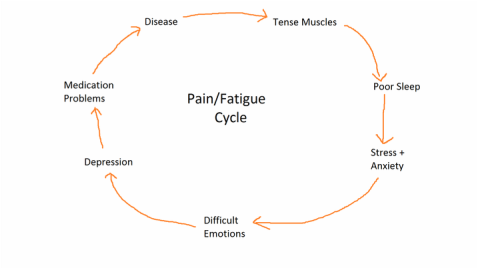Epigenetics: Environment changing genetics, aka how your past could have made you more susceptible to chronic pain.
Laying the groundwork:
We are all familiar with the Pain/fatigue cycle:
Laying the groundwork:
We are all familiar with the Pain/fatigue cycle:
Dr. Paul Durham, Distinguished Professor of Cell Biology, Director of the Center of Biomedical and Life Sciences at Missouri State University touched briefly on Epigenetics in his presentation on Trigeminal Physiology at the recent Conference of the American Academy of Orofacial Pain.
He performed some cognitive testing on rats and one of the tests was the Morris Water Maze, in which the rats were made to swim in a 4-foot diameter pool and look for a platform (underwater) on which to rest. It was found that the rats which were in chronic pain (based on their levels of pain chemicals in their body) were unable or took a very long time to locate this platform, while the rats which were not in pain learned very quickly where this platform was and were able to recognise landmarks to help them get to the platform right away.
This shows that pain decreased the cognitive functioning of rats, and because their genetic, biological and behavior characteristics closely resemble those of humans, and many symptoms of human conditions can be replicated in mice and rats, ("Rats and mice are mammals that share many processes with humans and are appropriate for use to answer many research questions," said Jenny Haliski, a representative for the National Institutes of Health (NIH) Office of Laboratory Animal Welfare. - See more at: http://www.livescience.com/32860-why-do-medical-researchers-use-mice.html#sthash.dtoMSZsf.dpuf) it may be safe to say that in humans, pain may decrease cognitive function.
He performed some cognitive testing on rats and one of the tests was the Morris Water Maze, in which the rats were made to swim in a 4-foot diameter pool and look for a platform (underwater) on which to rest. It was found that the rats which were in chronic pain (based on their levels of pain chemicals in their body) were unable or took a very long time to locate this platform, while the rats which were not in pain learned very quickly where this platform was and were able to recognise landmarks to help them get to the platform right away.
This shows that pain decreased the cognitive functioning of rats, and because their genetic, biological and behavior characteristics closely resemble those of humans, and many symptoms of human conditions can be replicated in mice and rats, ("Rats and mice are mammals that share many processes with humans and are appropriate for use to answer many research questions," said Jenny Haliski, a representative for the National Institutes of Health (NIH) Office of Laboratory Animal Welfare. - See more at: http://www.livescience.com/32860-why-do-medical-researchers-use-mice.html#sthash.dtoMSZsf.dpuf) it may be safe to say that in humans, pain may decrease cognitive function.


 RSS Feed
RSS Feed